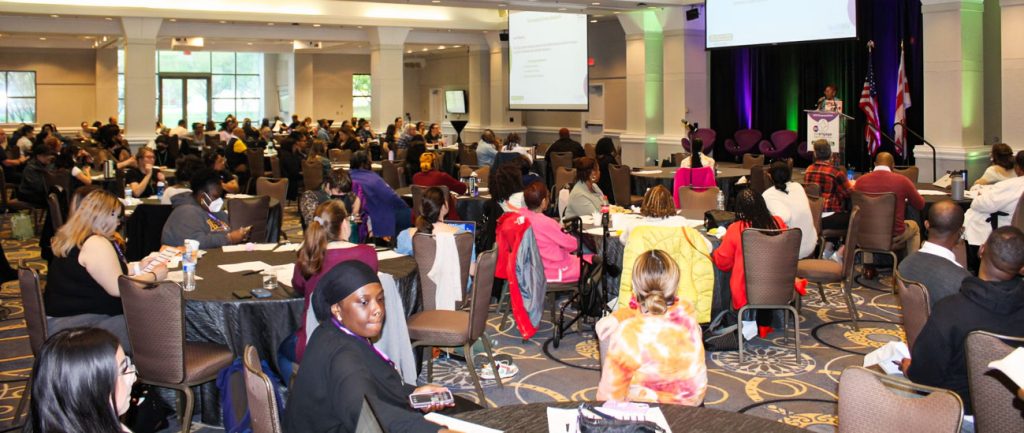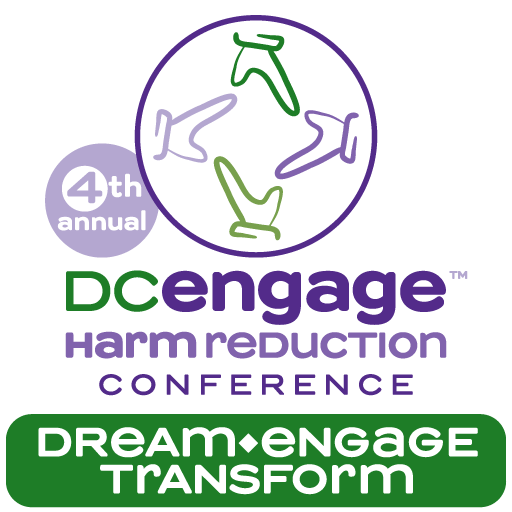Conference
Dream. Engage. Transform.

The DC Engage Harm Reduction Conference
The DC Engage annual Harm Reduction Conference is designed to build the capacity of community organizations, clinicians, and coalitions to implement culturally responsive, evidence-based, and inclusive harm reduction strategies and practices that help prevent opioid overdoses, reduce stigma, and promote equitable access to prevention, treatment, and support services in DC.
DC Health and HealthHIV held the Fourth Annual conference on Monday, April 7, 2025 in Washington, DC. The purpose of this day-long, in-person conference was to:
- Review recent trends and innovative approaches to address challenges in harm reduction at both community and clinical levels.
- Discuss strategies to meet the diverse needs of LGBTQ+, Black women, youth, and other marginalized communities in harm reduction initiatives.
- Identify and expand partnerships between community leaders, faith-based organizations, and clinical providers to reduce stigma and foster equitable harm reduction efforts.
Conference Agenda
- Why Dream, Engage, Transform? Objectives & Goal
- DC Engage and HRLI Overview and Resources
- Highlights from the Micro-Grantee Program
- Opening Audience Word Cloud & Poll Engagement
This session examines key data on harm reduction efforts from both local (DC Health) and national (CDC) perspectives. It highlights trends, outcomes, and disparities, offering insights into the impact of harm reduction initiatives on community health
Reimagining Reentry, Empowered Transitions
This breakout session focuses on best practices and engagement strategies to support individuals reentering the community post-incarceration. It emphasizes building trust, addressing barriers to care, and implementing harm reduction approaches that promote wellness, empowerment, and successful reintegration
Empowering Black Women: Advancing Harm Reduction Strategies
This session focuses on advancing harm reduction strategies tailored to Black women’s unique experiences. It highlights holistic, culturally informed approaches to fostering health, healing, and empowerment while addressing systemic barriers and promoting equitable access to care and support.
The Intersection of SUDs and Chronic Pain Management in Elder Care
This session examines the nuanced challenges at the intersection of substance use disorders (SUDs) and chronic pain management in elder care. It emphasizes evidence-informed approaches to addressing pain while mitigating risks associated with SUDs, fostering compassionate care, and enhancing the quality of life for older adults through tailored, interdisciplinary strategies.
This session provides an in-depth exploration of trauma-informed care, emphasizing the importance of recognizing trauma’s pervasive impact and integrating responsive practices. Participants will gain insights into fostering trust, promoting safety, and empowering individuals through culturally sensitive, evidence-based approaches that prioritize healing and resilience.
Available on-demandGrace in Action: Faith-Led Harm Reduction Strategies
This session explores the role of faith communities in advancing harm reduction principles. It highlights compassionate, inclusive approaches rooted in faith-based values to support individuals on their journey toward healing and wellness, fostering trust, dignity, and meaningful engagement within spiritual contexts.
Supporting Youth Recovery and Reintegration
This session delves into strategies for supporting youth on their recovery journey, focusing on resilience, holistic care, and reentry into family units. It emphasizes building trust, fostering healing, and strengthening family dynamics to promote sustained well-being and successful reintegration.
Leveraging PrEP & PEP for Harm Reduction Among PWUD
This session focuses on the latest advancements in PrEP and PEP as harm reduction tools for people who use drugs. It highlights innovations in access, delivery, and effectiveness, emphasizing their role in preventing HIV transmission within this community and supporting overall health and wellness.
This panel discussion explores the intersection of pleasure, party culture, and harm reduction. Panelists will share insights on fostering wellness, promoting safety, and addressing substance use in social settings, emphasizing inclusive, judgment-free strategies to support informed and empowered choices.
Available on-demand- Closing remarks
- Engagement poll
- Evaluation

